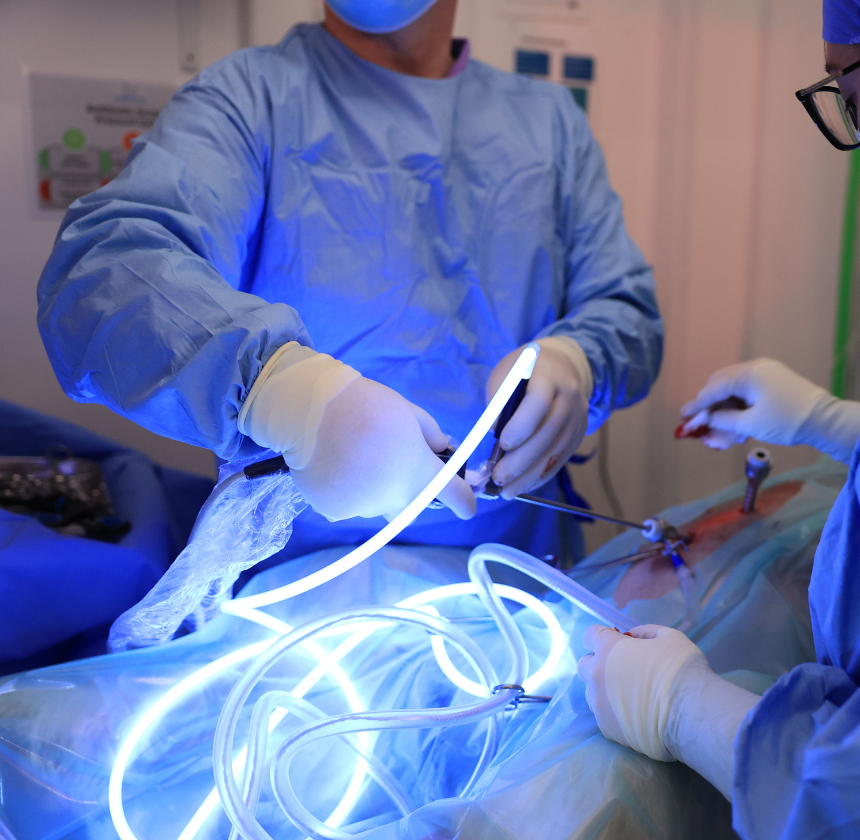Laparoscopic
Ovariectomy & ovariohysterectomy
Offering safer, advanced laparoscopic spay procedures for female dogs and cats.
What Is Laparoscopic Spaying?
Laparoscopic spaying is a minimally invasive surgical technique that uses a small camera (laparoscope) and specialised instruments inserted through tiny incisions. It offers unparalleled precision and reduced discomfort compared to traditional open spay surgeries.
Ovariectomy vs. Ovariohysterectomy
Both procedures are equally effective in preventing pregnancy and the risk of ovarian or uterine diseases:
Ovariectomy
It involves removing only the ovaries. It is a suitable option for many pets and effectively prevents reproduction and hormonal cycles.
Ovariohysterectomy
It involves removing both the ovaries and the uterus. This may be recommended for pets with uterine abnormalities or specific medical concerns.
The Procedure(s)
Laparoscopic ovariectomy/ovariohysterectomy procedures involve several key steps, each aimed at safely and efficiently removing the ovaries or ovaries and uterus while minimising tissue trauma and postoperative discomfort for the animal. Here’s an overview of the procedure:
Pre-Procedure Preparation
Before the surgery, we conduct a thorough examination and pre-anaesthesia blood tests to confirm your pet is healthy enough for the procedure. Your pet will need to fast for 8–12 hours before surgery (water is usually allowed). On the day of the procedure, our team will review the plan with you, ensuring all your questions are answered.
Anaesthesia and Sedation
The pet is placed under general anaesthesia to ensure they remain unconscious and pain-free throughout the procedure. An intravenous catheter is usually placed to administer fluids and medications during the surgery. Anaesthesia and vital signs, such as heart rate, respiratory rate, and blood pressure, are closely monitored throughout the procedure.
Surgical Incisions
Using specialised instruments, the surgeon detaches the ovaries (or ovaries and uterus, in the case of an ovariohysterectomy) by sealing the ligaments and blood vessels with advanced techniques. The organs are then removed through one of the small incisions, ensuring no residual bleeding.
Visualisation
A laparoscope, a small camera, is inserted through one of the incisions, providing a high-definition, magnified view of the ovaries, uterus, and surrounding tissues. This clear, real-time visualization guides the surgeon in performing the procedure with precision and minimal risk of complications.
Ovariectomy or Ovariohysterectomy
Using specialised instruments, the surgeon detaches the ovaries (or ovaries and uterus, in the case of an ovariohysterectomy) by sealing the ligaments and blood vessels with advanced techniques. The organs are then removed through one of the small incisions, ensuring no residual bleeding.
Closure & Recovery
After the organs are removed, the incisions are closed with absorbable sutures or surgical glue, promoting quick healing with minimal scarring. Your pet is monitored as they wake from anesthesia and provided with pain relief. They are then discharged with aftercare instructions, and a follow-up appointment is scheduled to ensure proper healing.
Laparoscopic Spay Benefits in Pets
Overall, laparoscopic ovariectomy, or ovariohysterectomy promotes numerous benefits for your furry friends, including reduced postoperative pain, faster recovery, and improved cosmetic outcomes.
Minimally Invasive
Involves small incisions, resulting in less pain, reduced scarring, and faster recovery compared to traditional spaying.
Faster Recovery
Pets experience quicker healing times, often returning to normal activities within a few days.
Reduced Risks
Smaller incisions and precise techniques reduce the risk of infection, bleeding, and other surgical complications.
Less Pain
The procedure causes less trauma to the surrounding tissues, leading to less postoperative discomfort.
Enhanced Visualisation
The laparoscope allows the veterinarian to view the internal organs in high detail, ensuring greater precision during surgery.
Improved Cosmetics
Laparoscopic ovariectomy employs small incisions for improved aesthetics, resulting in minimal and less noticeable scars.

